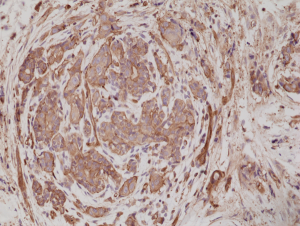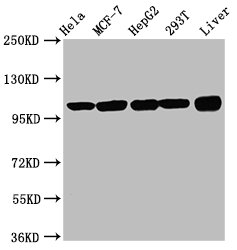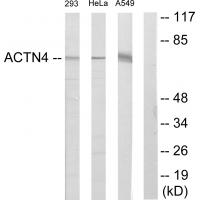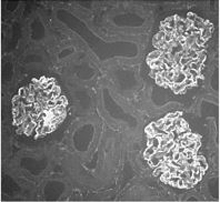
Immunohistochemical staining of formalin fixed and paraffin embedded human breast cancer tissue sections using anti-alpha-Actinin 4 rabbit monoclonal antibody (clone RM287) at a 1:200 dilution.
anti-Alpha Actinin-4 (human), Rabbit Monoclonal (RM287)
REV-31-1171-00
ApplicationsWestern Blot, ImmunoHistoChemistry
Product group Antibodies
ReactivityHuman
TargetACTN4
Overview
- SupplierRevMAb Biosciences
- Product Nameanti-Alpha Actinin-4 (human), Rabbit Monoclonal (RM287)
- Delivery Days Customer10
- ApplicationsWestern Blot, ImmunoHistoChemistry
- CertificationResearch Use Only
- ClonalityMonoclonal
- Clone IDRM287
- Gene ID81
- Target nameACTN4
- Target descriptionactinin alpha 4
- Target synonymsACTININ-4, FSGS, FSGS1, alpha-actinin-4, focal segmental glomerulosclerosis 1, non-muscle alpha-actinin 4
- HostRabbit
- IsotypeIgG
- Protein IDO43707
- Protein NameAlpha-actinin-4
- Scientific Descriptionalpha-Actinin 4 is an actin-bundling protein of ~100kDa that is associated with cell motility, endocytosis and cancer invasion. The alpha-actinin family comprises two non-muscle isoforms (alpha-actinin-1 and -4) and two skeletal muscle isoforms (alpha-actinin-2 and -3), with alpha-actinin-2 being also expressed in cardiac muscle. While alpha-actinin-4 is almost ubiquitously expressed, particularly high concentrations are found in glomeruli. On the subcellular level it is associated with actin stress fibers, but in certain cells it also localizes to the nucleus. Mutations in the alpha-actinin-4 gene cause an autosomal-dominant form of familial focal segmental glomerulosclerosis (FSGS), which is thought to result from a defect in glomerular podocyte function. A point mutation in the alpha-actinin-4 gene was found to generate an antigenic peptide that is recognized by autologous cytolytic T lymphocytes (CTL) on a human lung carcinoma. alpha-Actinin-4 interacts with a variety of proteins, including the ring finger protein BERP, the PDZ-LIM protein CLP-36, the hemidesmosomal and cell-cell contact protein BP180, and the tight junction protein MAGI-1. Moreover, alpha-actinin-4 forms a ternary complex with Ca2+/Calmodulin-dependent protein kinase II and densin-180, a protein of postsynaptic densities in CNS neurons. Ca2+-dependent association of alpha-actinin-4 with E3KARP is required for Ca2+-dependent inhibition of the Na+/H+ exchanger 3 (NHE3). - Recombinant Antibody. This antibody reacts to human alpha-Actinin-4. Applications: WB, IHC. Source: Rabbit. Liquid. 50% Glycerol/PBS with 1% BSA and 0.09% sodium azide. alpha-Actinin 4 is an actin-bundling protein of ~100kDa that is associated with cell motility, endocytosis and cancer invasion. The alpha-actinin family comprises two non-muscle isoforms (alpha-actinin-1 and -4) and two skeletal muscle isoforms (alpha-actinin-2 and -3), with alpha-actinin-2 being also expressed in cardiac muscle. While alpha-actinin-4 is almost ubiquitously expressed, particularly high concentrations are found in glomeruli. On the subcellular level it is associated with actin stress fibers, but in certain cells it also localizes to the nucleus. Mutations in the alpha-actinin-4 gene cause an autosomal-dominant form of familial focal segmental glomerulosclerosis (FSGS), which is thought to result from a defect in glomerular podocyte function. A point mutation in the alpha-actinin-4 gene was found to generate an antigenic peptide that is recognized by autologous cytolytic T lymphocytes (CTL) on a human lung carcinoma. alpha-Actinin-4 interacts with a variety of proteins, including the ring finger protein BERP, the PDZ-LIM protein CLP-36, the hemidesmosomal and cell-cell contact protein BP180, and the tight junction protein MAGI-1. Moreover, alpha-actinin-4 forms a ternary complex with Ca2+/Calmodulin-dependent protein kinase II and densin-180, a protein of postsynaptic densities in CNS neurons. Ca2+-dependent association of alpha-actinin-4 with E3KARP is required for Ca2+-dependent inhibition of the Na+/H+ exchanger 3 (NHE3).
- ReactivityHuman
- Storage Instruction-20°C
- UNSPSC12352203






